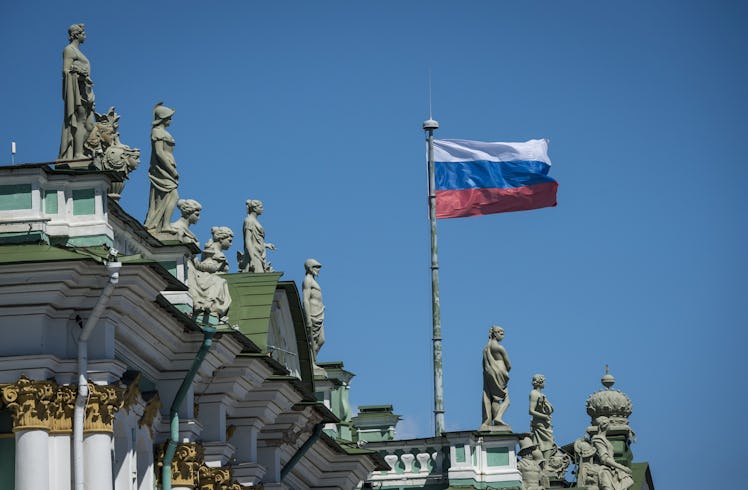
The Chances You Saw Russian Facebook Ads Are Apparently Pretty High, Report Says
We've known for a while now that Russia did, in fact, purchase advertisements from Facebook during the last election cycle. And on Oct. 30, a report from the company has a new assessment of how many people Russian Facebook ads reached, estimating that the false content reached upwards of 126 million users. This shocking new figure is yet another disclosure that's further disproving Trump's frequent assertion that Russia had absolutely zero involvement in the 2016 election.
CNN obtained a copy of the report, in which Facebook General Counsel Colin Stretch states that the Russian-produced content could have reached 29 million users directly, with that figure going up to 126 million users if you count shares. In the report, CNN highlights that this figure accounts for over half of the U.S. voting population.
Facebook is set to present this new report to the Senate Judiciary Subcommittee on Crime and Terrorism this week. According to CNN, lawyers from Facebook, Google, and Twitter are all scheduled to answer questions before the subcommittee, as well as the Senate and House Intelligence Committees, on how each platform was potentially used by Russians in an effort to influence the 2016 election results.
Back on Sept. 6, Facebook officially announced in a blog post that the company sold $100,000 worth of ads to a Russian troll farm that has ties to the Kremlin. The shocking statement detailed that roughly 3,000 ads were linked to about 470 inauthentic accounts, all connected to a Russian government-linked troll farm known as the Internet Research Agency (IRA). The agency is known for pushing propaganda serving Kremlin interests, mainly through social media channels.
It's difficult to say exactly how many people actually read the content, and how many just scrolled past while flicking through their newsfeeds. But the significance of this report is not to be understated. With the recent news of the indictments of Paul Manafort and Rick Gates (two former high-level officials who worked on Trump's 2016 campaign, and the first two names to come out of the Russia probe), as well as the arrest and plea deal from former Trump advisor George Papadopolous, this report exhibits yet another layer of Russia's alleged role in the 2016 election.
So, how do you know if your Facebook feed fell subject to this Russian-produced content?
Unfortunately, Facebook has not provided examples of the advertising, and it's their policy to take down any pages and content that is illegitimate. The company did, however, provide a description of the content in their original report on Sept. 6. In the blog post, Chief Security Officer Alex Stamos writes:
"...the ads and accounts appeared to focus on amplifying divisive social and political messages across the ideological spectrum — touching on topics from LGBT matters to race issues to immigration to gun rights.
Although we don't have a ton of information on what the advertisements actually looked like, we do have a sense of what the assumed goal of the IRA was — to stir the pot of the electorate.
This objective is evidenced by the reports of the activities from fake Facebook group in particular: Heart of Texas, which CNN confirmed was being controlled out of Russia. According to Business Insider, the group had about 225,000 followers and tried to organize anti-immigrant and anti-Clinton rallies across Texas in November 2016, just days before the election.
Pages like Heart of Texas could have significantly swayed the electorate in their decision to vote.
Stamos also notes that about a quarter of the content purchased was geographically targeted, meaning that the accounts linked to the IRA chose specific regions in the country to distribute given pieces of content. Because of the way the electoral college allots votes to each state, the IRA could have strategized to target specific geographical regions, and by shifting the vote there affected the national election.
Given that Trump's stunning victory last November was largely attributed to the unexpected turnout of rural voters, the potential influence of the content purchased by the IRA could have been huge. Although Facebook has stated that most of the content "didn’t specifically reference the U.S. presidential election, voting or a particular candidate," there's no way to completely rule out the possible influence of these advertisements and pages.
It's been one whirlwind of a day in terms of the possibility of Russian meddling. From the looks of both the Russia probe led by Robert Mueller and this investigation, there will be no shortage revelations in the coming weeks.